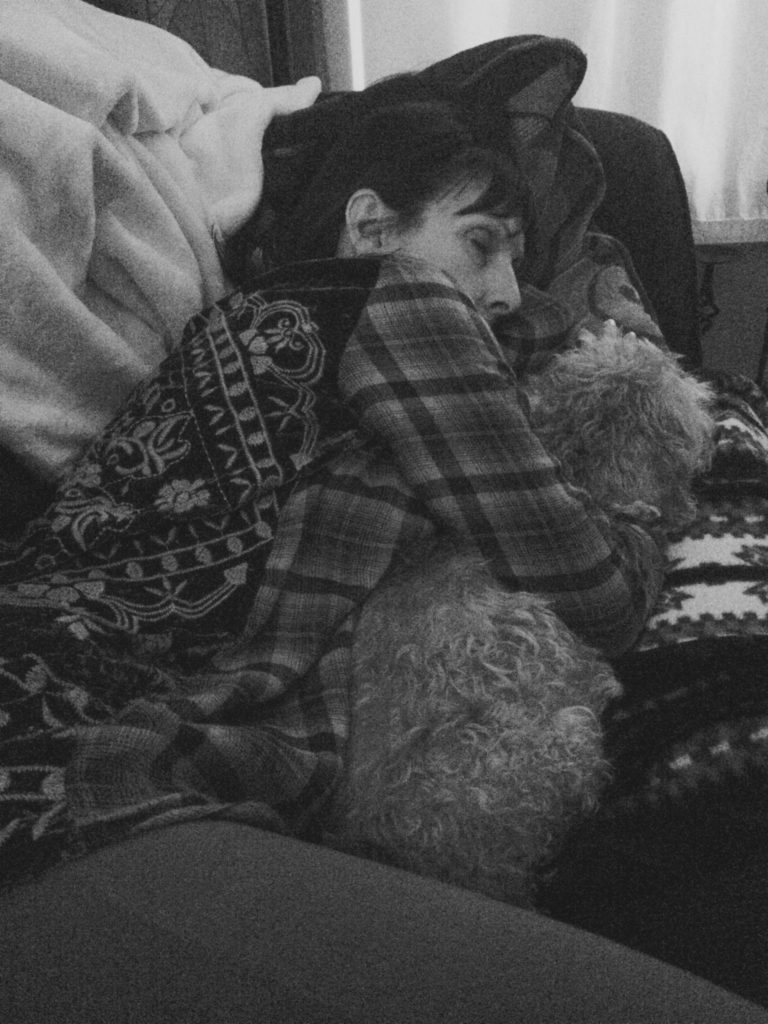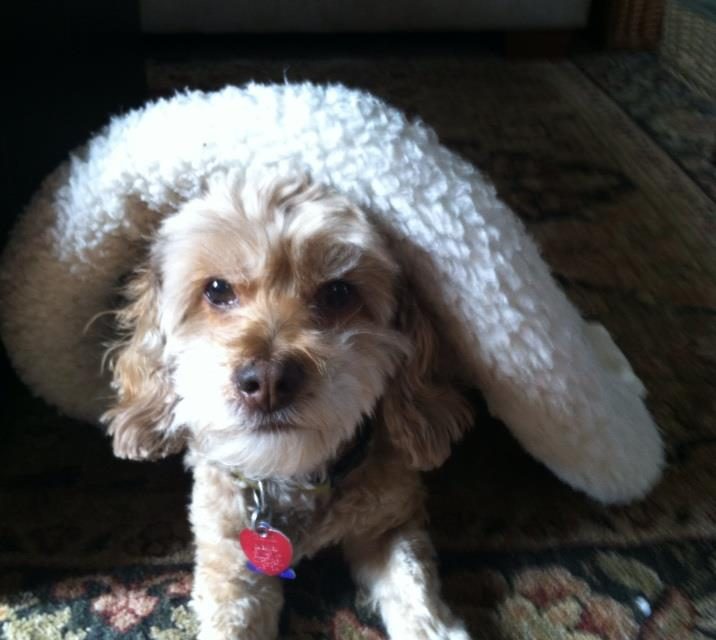Many months ago I fessed up, telling my husband that I still cried over Tigger. I told him I still missed him and didn’t talk about it much because while some people are crazy sensitive, many more just prefer not to talk about death and like to hold grief at arms length. I think people don’t know how to sit with one another in discomfort, and it makes them uncomfortable because they cannot fix anything or change an outcome. And yet I know how important it is for us to talk through our grief or fear. If I was queen of the world, I’d wave my magic wand and make the sharing of sad stories okay and help others know that this is how we heal.
The truth is that the day Tigger left was the day I truly understood that death was real, that we could be here one moment, and gone the next. The day Tigger left was the day I began to consider the reality of my own eventual death.
The loss of a pet is deep and agonizing, and grieving isn’t over in a day or two.
I love dogs (well, small dogs if I’m truthful), but I am still not ready for another one. I’m not ready because I know I’m still looking for Tigger, and I don’t have room for something new. This story is the story of my last day with Tigger, the deepest loss I have personally experienced to this day, written a few months after he died in 2016.
***
There was a tiny perfect pin-sized droplet of blood on his leg, vivid and red, alive. He was lying in my lap, motionless. Rob reached over me with a tissue to dab his leg, where the IV had been, and the care he took to do so left me breathless.
He was 15 when he died, or rather when I helped him die.
He was deaf, blind, incontinent and struggled to walk and he had a belly that filled with fluid as fast as it could be drained. He was in the beginning stages of congestive heart failure and had a cancerous tumor blocking both valves in his heart.
Tigger was my dog, but he was far more than that. He was the one constant in my life adventure as I raised two daughters, divorced their dad, tried to remember who I was as I began a new life as a single woman. He accompanied me on my drive across country when I moved from the suffocating suburbs of Wayland, Massachusetts to Boulder, Colorado at the age of 51. He even got to witness the beginning of my new relationship to the man I married in April 2016.
The things I miss fascinate me because they are ordinary. Things like the motion of stepping over the rug he had countless accidents on at the front door upon coming home, or being awakened by the sound of him scooting around at night because he was uncomfortable or the morning ritual of helping him out of his crate saying, ‘it’s okay,” while I sponged his urine-dampened fur. I desperately miss the way he hobbled in my direction whenever I returned home and how he was always there to comfort me. If he heard me crying, he would come to me, lick my face and then curl up in my lap. His love was unconditional.
I couldn’t ask Tigger what he wanted when his health failed. It was up to me.
I had to make an assumption without knowing anything for certain. I had recently read “Being Mortal,” by Atul Gawande which provided me thinking tools as I imagined my own mortality and considered what was important to me. I considered what I was afraid of, and began to articulate what circumstances would have me ready for my own end point. My own personal thoughts about quality of life were all I had to go on.
I received loving and gentle advice from his vets when I pressed, and from friends who had stood in my shoes and especially from Rob but it was up to me to make the decision about Tigger.
There were medical interventions we could take advantage of, but these available measures were not a cure and would only prolong his life an additional three to four months. Months where he would potentially have his belly drained weekly, endure the addition or changing of countless medications and months where he would still not be able to remember what to do when standing outside on a beautiful day in January without a leash or collar, be able to cuddle comfortably for too long with me on the couch, or be allowed to sleep outside of a crate, in order to keep his accidents contained.
What kind of life was I prolonging? The only thing that seemed to give Tigger comfort was my presence and I could not be with him all the time. He slept underneath my desk on a soft pillow when I wrote, and I pulled him up beside me on the nights we stayed home watching television or reading. Seeing those deep eyes plead with me every time I left hurt my heart. I began to understand that to prolong his life was an attempt at easing my life, not his; a way of putting off the inevitable feelings of loss.
My own philosophy about humane death and life quality were empty words if I couldn’t apply them to the most loving and loyal creature I had ever known. Still I waited ten days after he experienced a sudden collapse, a syncope, before I called the home euthanasia organization and told them through sobs, “I’m not ready. I just want to understand what the process is.”
I called Tigger’s cardiology clinic, still sobbing, asking them if I was a horrible person for considering euthanasia, to which they replied, “No.” They told me the fluid in his belly was pressing on all of his internal organs and he had to be uncomfortable.
A few days later, on a beautiful gift of a winter day in Colorado, a spring day in January, I brought Tigger outside and he just stood looking at me, as if trying to remember what to do. This was a dog who once had to be leashed so he would not run away in pursuit of a squirrel or bunny. He squinted his eyes as if the sun was too bright and stood on wobbly legs, confused. I knew then that it was time.
The morning he left us, the day I helped him die, was horrific. I curled up beside him at 5 a.m. and then lifted him on to the couch and sat with him next to me petting him over and over again and telling him how much I loved him. The hours lasted forever, went too fast, and then the vet was there, and she was kneeling beside us on the floor and I fell apart.
Tigger barked, howled almost, when Rob let her in. He hadn’t barked for weeks. Did he know? Was he protesting? Did he want to stay? In our fifteen years together, he had always had a knack for sensing my emotions, licking my hand or curling up next to me whenever I felt lost or sad.
I don’t know how long I sat with him in my lap, stroking his head, unable to catch my breath and waiting for someone to say, ‘just kidding. no need for euthanasia, he’s all better.’ But the technician eventually asked if we were ready and I felt like I was melting, disintegrating into the sofa, poof, disappearing. I finally said, yes, and I bent to kiss his head, inhaling that sweet, slightly pungent scent of his skull, saying, I love you. You were the best friend I’ve ever had. Thank you.
His heart beat slowly and then it….stopped. The absence of the pulse was impossible to grasp. He was alive and then he was not. He was gone. His body was there, his snout elongated and aged, his eyes open, now absent of light, but he was gone. I still don’t understand how this is possible. How he was one moment there and the next gone. No drama. No shudders. Just gone.
After a few moments alone with my lifeless best friend, we lifted Tigger onto a soft fleece coverlet and he was swaddled and placed in my arms. Rob put my clogs in front of me so I could slip into them and carry him to the car.
I pleaded, “did I do the right thing?”
I felt old, broken, fragile and lost as I stepped down the front steps with him in my arms, my feet tentatively seeking the steps. We walked to the car trunk and I laid Tigger down. I kissed his head and said, thank you, I love you. We watched the car pull away with him and then things went blank for me. Rob cried. I cried. I passed out exhausted on the couch, slipping into sleep mid-sob, and Rob went into our office to work. When I woke, I cleaned the house. I vacuumed and cleaned toilets and sinks and then exhaustion overcame me again and I fell on to the couch again, weary and worn. When I woke, I was frantic. Rob had left for an evening meeting and I wanted him home. Now. It was too long to be alone. It was too quiet.
When Rob returned, we went to get something to eat. I had calmed but fell apart again when we came home. Like a child, I could not believe he was really gone. I wanted to see that body, the wobbly back legs trying to balance on the wood floor looking to see what door we were entering. I wanted to see those beautiful dark eyes looking at me, saying…”Oh! You’re home. You’re finally home.”
I wanted everything to be okay.
There is an enormous distance to be bridged between individual philosophy and reality. Common wisdom tells me I did the right thing, letting him die with as much dignity as possible and without living in pain, but I am tormented with not knowing for sure.
His absence is loud and deep and at times I feel untethered. No shiva calls, no mourning period, no ceremony where his passing was recognized. No certainty that I gave him what he would have asked for himself if he could. This is not easy.
His ashes are in a light blue box on a shelf in our living room. Some day I will buy or make an urn that is worthy of holding his remains, but until then I whisper to what I have left of him, “I love you. I miss you. I pray I did right by you.”
Tigger left us in January 2016 and his death taught me more about loss than any other life experience. The friends that let me cry, that understood the deep connection I had to this beautiful animal and those that let me talk or understood that I needed to be alone were healing angels. The owners of the small dogs I would encounter on walks after he died who would let me pet their dogs and not look away when I would burst into sudden tears were healing angels.
We can do better when we encounter grief in our culture. We can spend more time letting those we love express how they feel and less time worrying about our own discomfort. We can listen. We can hug. We can stop trying to hurry others through their process.






